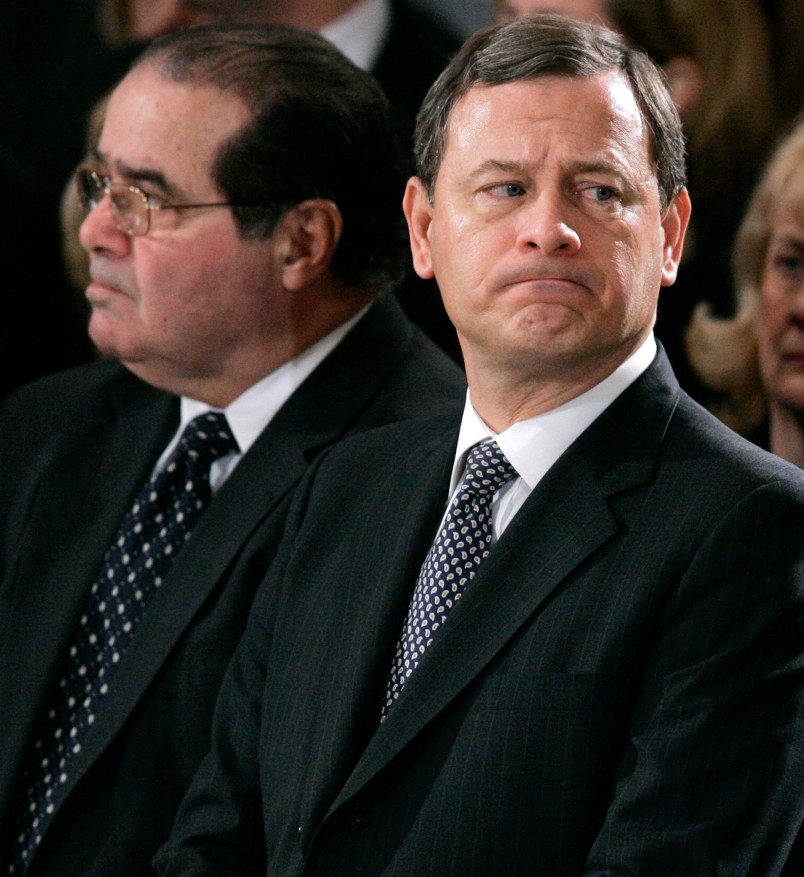A Supreme Court decision to overturn Obamacare subsidies would directly affect millions of Americans in key swing states and pose a political dilemma for Republicans ahead of the 2016 election — at least unless they can get behind a viable health care alternative.
A ruling in the looming case King v. Burwell could wipe out health insurance subsidies for some 3 million Americans in a dozen states that could decide the 2016 election and rely on the federal HealthCare.gov exchange, according to new research by professors Theda Skocpol of Harvard University and Lawrence R. Jacobs of the University of Minnesota.
In Florida, nearly 1.2 million Americans are enrolled in a federal exchange plan as of early 2015. In Ohio, Virginia, Pennsylvania, New Hampshire and North Carolina a total of 1.3 million Americans would lose their plans. Notably, in each of those states the number of federal exchange customers who risk becoming ineligible for subsidies exceeded the 2012 presidential election winner’s margin of victory in that state, Skocpol and Jacobs found.
“These are middle income people — making between around $30,000 and $80,000. A lot of them around the median income depend pretty heavily on the subsidies. Many of them are Republican voters,” Skocpol said. “And they’re not as easily ignored by Republicans as poor people are.”
The chart below was made by Skocpol and Jacobs:

A few caveats. Not every exchange customer receives the premium tax credits but most do — the subsidies cover 76 percent of premiums on average, available to Americans between 133 percent and 400 percent of the federal poverty level. The enrollment numbers could also change between now and June 2015, by when the Supreme Court is expected to issue its ruling.
If the justices scrap the subsidies, Democrats would quickly start banging the drum for fixes. In theory the impact of a Supreme Court ruling can be mooted if every state builds its own “state-based” exchange — the subsidies then wouldn’t be restricted for anyone who’s currently eligible. But GOP governors and lawmakers are likely to face enormous political pressure from conservatives to resist any fixes, putting them between their base and their constituents.
“We actually think this will create enormous problems first and foremost for Republican governors and for Republicans in Congress,” Skocpol said.
Ohio, Wisconsin, and North Carolina have Republican governors. Pennsylvania, Virginia, and New Hampshire have Democratic governors who face Republican legislatures that could block efforts to build state-run exchanges. Governors in Ohio, Iowa and Michigan have already expanded Medicaid for low-income residents. They risk facing an unenviable situation where the poor are subsidized but residents earning slightly more are not.

From left: Wisconsin Gov. Scott Walker; Michigan Gov. Rick Snyder; Pennsylvania Gov. Tom Corbett; Florida Gov. Rick Scott, and Ohio Gov. John Kasich. Corbett was defeated in 2014; the rest won reelection. (AP Photo/File)
Ironically, the negative consequences of a Supreme Court ruling to restrict the subsidies would be most prevalent in Republican-heavy states, which overwhelmingly refused to build their own exchanges. The 18 states that built their own exchanges lean Democrat or are divided, with the exception of Idaho — they would be unaffected by a Supreme Court decision.
In Congress, Republicans would be hard-pressed to support any improvements to counteract a potential Supreme Court ruling against Obamacare, which many of them are publicly rooting for. The new GOP majorities in the House and Senate are unlikely to support a fix to Obamacare after spending the election cycle attacking the law. Top Republicans met on Thursday to discuss their response, but they don’t yet have a contingency plan in place.
“We’re obviously doing contingency planning for King v. Burwell,” House Ways & Means Chair Paul Ryan (R-WI) told reporters after the meeting. “It would be wrong not to. … That’s something that is an ongoing conversation and we’re doing all of our diligence on that.”
It’ll be rough sailing for Democrats, too. A Supreme Court ruling that guts a centerpiece of President Barack Obama’s signature domestic achievement would be a severe blow. The subsidies are a key pillar of Obamacare; without them the individual mandate requiring most Americans to buy insurance is not viable for the many who would not be able to afford it. Insurance companies would face a loss of customers and are already demanding a fix if the Supreme Court invalidates the federal exchange subsidies. For the Obama administration, the implementation fallout threatens to be chaotic.
For the Democratic nominee in 2016, the strategy is clearer: accuse the Supreme Court of making an activist decision to gut Obamacare and propose a tweak to the legislative language to make clear the subsidies are permitted on the federal exchange.
The battle could ultimately turn on whether Republicans devise a viable health care solution of their own and persuade voters it would be better than Obamacare. The optics of a Supreme Court rebuke of Obamacare may be helpful to them. But the task of crafting an alternative to Obamacare has eluded Republicans in Congress, who have failed to coalesce around any plan of their own in the five years since the law was enacted.
Correction: The researchers cited in this article initially erred by including Nevada and New Mexico among states using the federal exchange which may lose their subsidies in a Supreme Court ruling. In fact, they run state-based exchanges with some federal assistance. As such, their subsidies are likely safe. The table has been updated to remove those states. TPM regrets the error.










